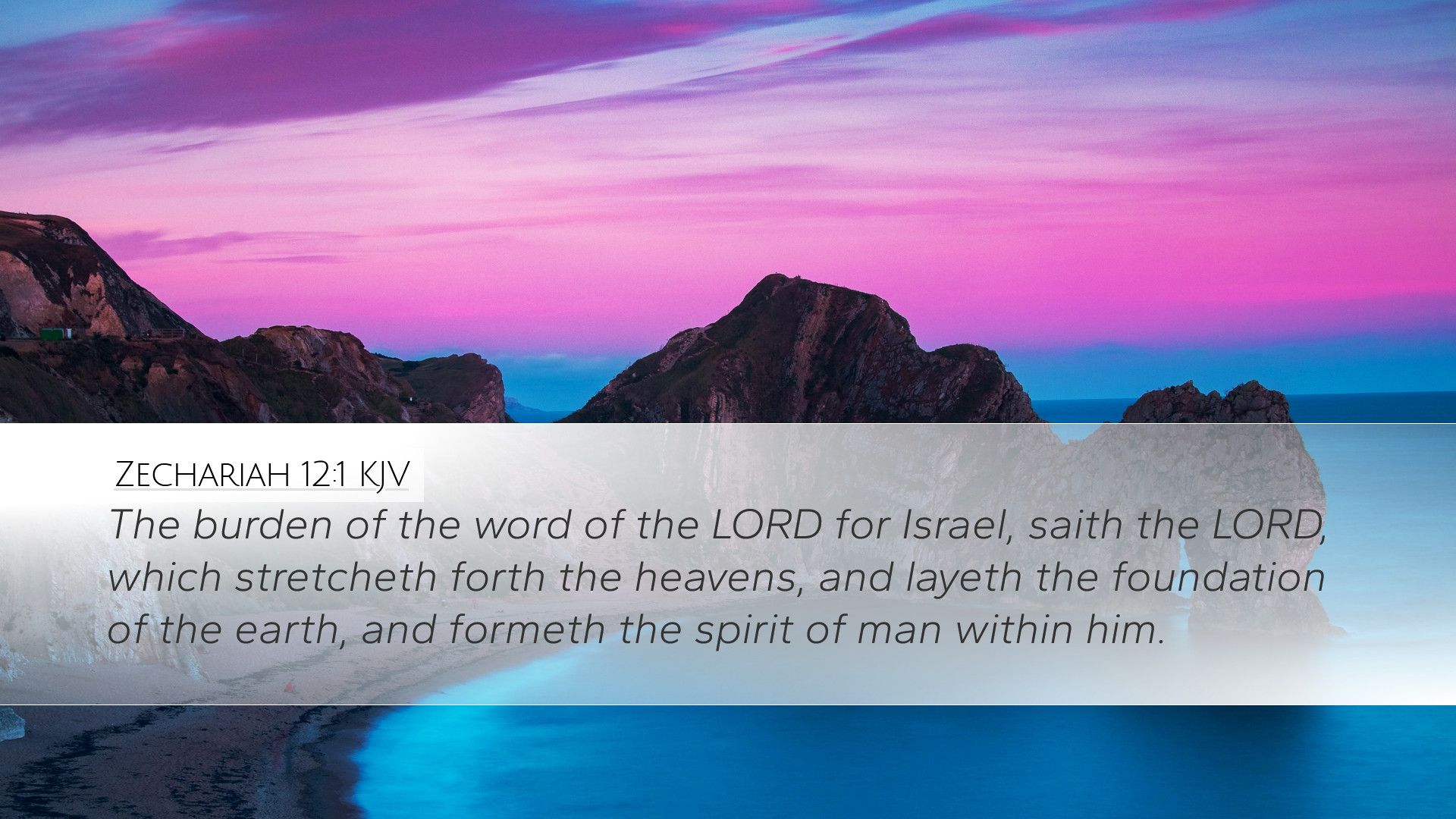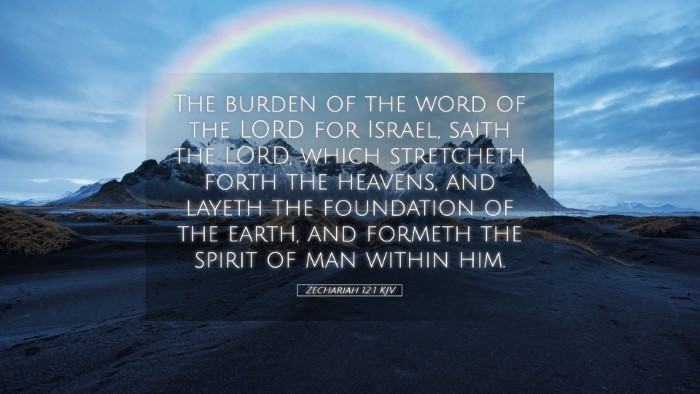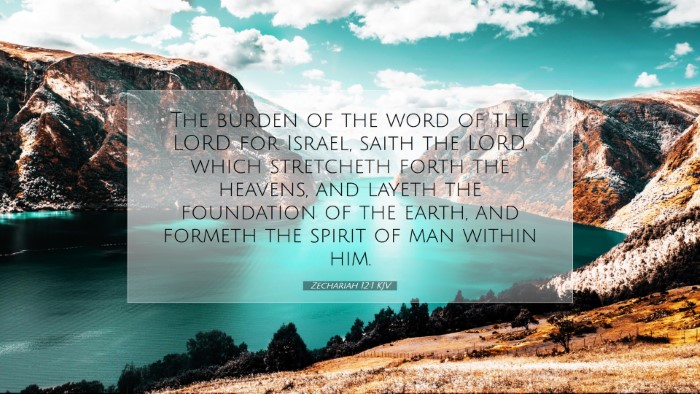Old Testament
Genesis Exodus Leviticus Numbers Deuteronomy Joshua Judges Ruth 1 Samuel 2 Samuel 1 Kings 2 Kings 1 Chronicles 2 Chronicles Ezra Nehemiah Esther Job Psalms Proverbs Ecclesiastes Song of Solomon Isaiah Jeremiah Lamentations Ezekiel Daniel Hosea Joel Amos Obadiah Jonah Micah Nahum Habakkuk Zephaniah Haggai Zechariah MalachiZechariah 12:1
Zechariah 12:1 KJV
The burden of the word of the LORD for Israel, saith the LORD, which stretcheth forth the heavens, and layeth the foundation of the earth, and formeth the spirit of man within him.
Zechariah 12:1 Bible Commentary
Commentary on Zechariah 12:1
Zechariah 12:1 (KJV): "The burden of the word of the LORD for Israel, saith the LORD, which stretcheth forth the heavens, and layeth the foundation of the earth, and formeth the spirit of man within him."
Introduction
This verse serves as a pivotal declaration within the book of Zechariah, emphasizing the prophetic burden God places upon His messenger regarding Israel. The verse introduces a profound theological statement about God’s sovereignty and creative power. The insights drawn from public domain commentaries such as those by Matthew Henry, Albert Barnes, and Adam Clarke provide a rich tapestry of meaning that is relevant for pastors, students, theologians, and Bible scholars alike.
Theological Implications
The verse opens with "The burden of the word of the LORD," indicating that the message to be conveyed is significant and heavy with spiritual importance. According to Matthew Henry, the term “burden” implies a serious prophetic message, one that carries a weighty responsibility for both the prophet and the audience. This is not merely an announcement but a declaration meant to stir the hearts of the people.
Albert Barnes notes that this burden centers primarily around Israel, hinting at the nation’s future trials, restoration, and the divine assurances of God's involvement in their affairs. This contextual setting frames the entire chapter, which deals extensively with the fate of Israel, illustrating both a sense of impending judgment and hopeful redemption.
Adam Clarke expands on the implications of God's sovereignty in creation by pointing out that the phrase "which stretcheth forth the heavens" serves as a reminder of God's omnipotence. This divine sovereignty is critical for understanding the nature of the prophecies that follow; if God is indeed the creator of heaven and earth, He possesses the authority and power to intervene in history and shape the destiny of nations.
Divine Authority and Creation
The mention of God's creative acts ("stretcheth forth the heavens" and "layeth the foundation of the earth") points to His ultimate authority over all creation. Matthew Henry elaborates that these phrases are intended to instill confidence in the people, representing God as a powerful creator and sustainer who will act in their favor. This reflects the essential character of God as not only a judge but also a protector of His covenant people.
Albert Barnes emphasizes the idea that understanding God's sovereignty over creation provides a framework for believers to trust His promises. If God has the power to create and sustain the universe, He is certainly capable of guiding and securing the fate of His people, Israel, despite their circumstances.
Adam Clarke further notes that the phrase “formeth the spirit of man within him” indicates God's intimate involvement in the lives of humanity. This personal touch reinforces the theme of divine providence, demonstrating that God is not only transcendent but also immanent, actively shaping and directing the human experience.
Prophetic Fulfillment and Eschatological Perspective
This verse serves as a foreshadowing of the eschatological themes found throughout Zechariah, particularly regarding the future of Jerusalem and the fate of Israel in the last days. Matthew Henry suggests that the prophecies contained in the subsequent verses anticipate a day of reckoning where God will defend His people against their enemies.
Albert Barnes underscores that this prophecy has a dual application: it speaks to both the immediate context of Israel's struggles and the ultimate fulfillment in Christ. The eschatological implications resonate through Christian theology, affirming the belief in a future where God will restore and exalt His people.
The significance of “the spirit of man” as noted by Adam Clarke reflects the personal nature of God's work. This aspect emphasizes that the transformative power of God is not only a cosmic act but also deeply personal, where individual spirits are molded and shaped by divine will, leading to a collective restoration of Israel.
Conclusion
Zechariah 12:1 encapsulates profound truths about God’s sovereignty, creative authority, and personal involvement in human affairs. As pastors, students, theologians, and scholars reflect on this verse, it is essential to consider the weight of the prophetic burden, the overarching themes of restoration and judgment, and the comforting assurance of God’s omnipotence in guiding His people.
In summary, the verse serves not just as a prophetic declaration but also as a reassuring promise to the faithful that amidst trials and tribulations, God remains the sovereign creator and sustainer, capable of transforming hearts and securing His purposes in history.


